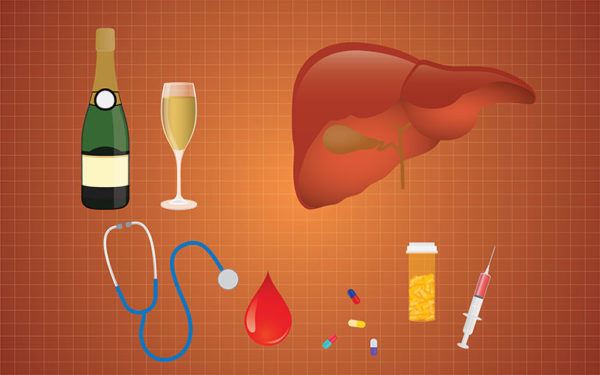The liver is one of the largest organs in your body. It produces enzymes that aid in digestion of food, removes toxins from your body, stores excess nutrients, maintains cholesterol levels, and produces proteins that are required for blood clotting. Some people suffer from liver problems from birth, whereas others may damage their liver through excessive consumption of alcohol, poor diet, or exposure to harmful chemicals released by drugs and tobacco. Viral infections can also damage you liver to a great extent. When your liver is damaged, you will start showing some symptoms, and recognizing those symptoms can help you treat your liver effectively.
What Are The Signs Of Liver Damage?
1. Swelling
As a result of liver damage, a condition called ascites can occur where fluid is built up inside your abdomen causing it to swell. When gravity acts on it, the fluid may move to your legs, causing them to swell too. If the swelling does not subside you should consult a doctor to help you remove the fluid.
2. Abdominal Pain
Abdominal pain can accompany liver inflammation. You can experience pain in the upper right portion of your abdomen when your liver is inflamed. The condition will worsen if the damage continues.
3. Spidery Red Lines On Skin
If you might notice red spots with extending spidery red lines on your skin, you might be suffering from a condition known as spider angioma or spider nevus. Liver damage can cause the swelling of blood vessels present slightly beneath the surface of your skin. If you notice more than 3 such spots you should get a diagnosis.
4. Difficulty Losing Weight
The major fat-burning organ in your body is the liver. It aids in digestion by producing bile, a secretion that break down fats, and also helps in the absorption of fats and other nutrients. When the liver is damaged, its fat-burning ability is compromised. A damaged liver can also lead to the build up of toxins and which can get stored in fat cells. If you experience difficulty losing weight, especially in the abdomen area, even after eating right and exercising regularly, it might be due to liver damage.
5. Abnormal Stools And Diarrhea
The bile salts released from your liver to your stool during digestion gives your stool a brownish color. If your liver does not produce enough bile or if the bile duct is blocked, enough bile salts will not reach your stool, making it appear pale. You can even suffer from diarrhea if your liver is damaged. You should consult your doctor and get your liver checked if these symptoms persist.
6. Dark Urine
When old or damaged blood cells are broken down, a pigment called bilirubin is released. Bilirubin usually binds with bile and gets removed from the body through the digestive tract. If your liver does not produce enough bile or if the bile duct is blocked, bilirubin accumulates in the bloodstream. Some of the accumulated bilirubin may pass through the kidneys and be expelled in urine, making your urine appear dark in color.
7. Easy Bruising
One of the major functions of liver is to produce proteins that are vital for blood clotting. If your liver is damaged, it will not be able to produce the required clotting factors, resulting in easy bruising or bleeding.
8. Body Odor
If your liver is unable to get rid of the toxins from your body efficiently, you might experience excessive sweating that can cause you to have bad body odor. You can detox your liver, and if the problem still continues get it diagnosed by a professional.
9. Fatigue
A damaged liver has to work extra hard to remove the toxins from your bloodstream. Even in doing so, it might not be able to detoxify your body completely and that might lead to an accumulation of toxins. As a result, you might experience chronic fatigue.
10. Encephalopathy
When the toxins in your blood reach the brain they cause a decline in brain function, which is called encephalopathy. This can result in disorientation, confusion, lack of concentration, short-term memory loss, mood swings, headaches, and even unconsciousness.
11. Oversensitive Or Itchy Skin
Oversensitive or itchy skin can be a symptom of liver cirrhosis, a liver condition in which scar tissues form on the liver. Your skin becomes sensitive and itchy because of the accumulation of bile acids in your bloodstream, and this problem can worsen if not treated on time.
Since the liver serves many important functions, it is necessary to take good care of it. You should follow a healthy diet, drink plenty of water, exercise regularly, and avoid excessive consumption of alcohol and medications.



Leave a reply